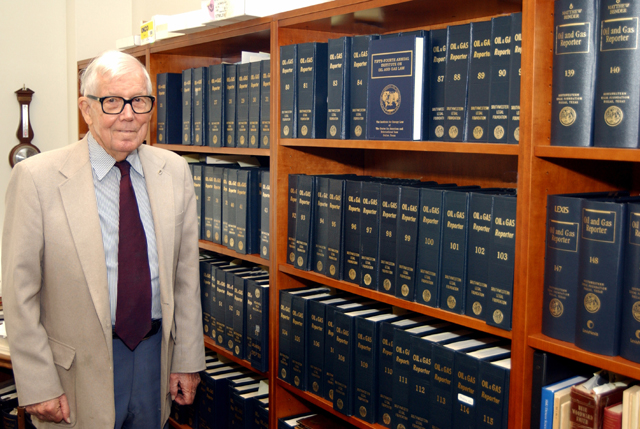Ed Horner Completes Nearly Five Decades for Oil & Gas Reporter

Volumes of the Oil & Gas Reporter publication, dating back nearly 50 years, line Ed Horner's faculty office at Baylor Law School.
by Alan Hunt, (254) 710-6271
Ed Horner, an 89-years-old professor emeritus of law at Baylor Law School, has penned his last article for the Oil & Gas Reporter, a monthly report of cases and administrative rulings in the fields of oil and gas law and taxation. After 46 years, and 600 articles, he has decided it is time to retire.
The Reporter is published monthly by LexisNexis and edited by The Center for American and International Law (formerly the Southwestern Legal Foundation) of Plano, Texas. Horner served as one of four Texas-based members of the board of editors who focus on and analyze cases and rulings in the Lone Star State. They are among 20 members of the board of editors nationwide, who all provide their services on a voluntary basis, says Horner, who still works daily in his faculty office at the Sheila and Walter Umphrey Law Center.
Half a century of writing and observing one of the world's most volatile industries has given him a keen insight into the dramatic changes that can instantly affect consumers' budgets. A recognized authority on oil and gas law, he recalls paying less than 40 cents a gallon for gasoline when he contributed his first article to the publication. "I understand that at one time during the early 1930s, oil sold at 10 cents per barrel in the east Texas field around Kilgore," says Horner. "Today, oil rarely seems to go below $50 per barrel and a gallon of gas regularly tops the $2-mark."
"But we tend to overlook the fact that nearly 40.5 cents of the pump price is for federal and state taxes," he says. "And it is still a relative bargain when compared with the inflation-adjusted price of almost $3 per gallon we were paying in 1981."
As for the future, Horner is reluctant to offer any prediction about oil prices and the future of the oil industry. He says there are many widely varying factors that can have impact on the present and on the future generations of the industry. These factors include what impact the environment will play in the discovery of new sources of supply (the Arctic Circle), the emission controls on the conversion of oil to its uses (refineries), and its use in the automobile, along with such problems as climate control and global warming. "Also involved is the question of U.S. relations with foreign countries who now supply approximately half of the oil consumed in the U.S. The allowables set by these countries that produce and sell oil have a great impact on the price per barrel."
A graduate of Southern Methodist University (SMU) Law School, Horner taught at Baylor Law School from 1948 to 1960, then for eight years, 1960-68, at the night division of St. Mary's Law School in San Antonio. He rejoined Baylor Law School in 1968 and continued to teach until 1985, when he retired after 37 years of full-time teaching. He continued to teach oil and gas law on a part time basis as an adjunct law professor until 2004.
Horner recalls clearly the first article he wrote in 1959 for the Oil & Gas Reporter. "I remember holding my breath whether it was going to be printed or not," he said. "At the time, Professor Bill Masterson, my professor at SMU, was the editor-in-chief. It was like waiting for him to post the final examination grades." His old professor passed the article, and Horner was on his way to a 46-year writing stint for the Oil & Gas Reporter.
Horner was honored recently by the board of editors at their annual luncheon in Houston, where they praised him for his nearly five decades of "extraordinary service as a distinguished editor" of the publication. Horner says his position on the board of editors has been filled by a practitioner from Midland.
"After nearly 50 years, it will seem strange not having to meet a deadline any more," he said.